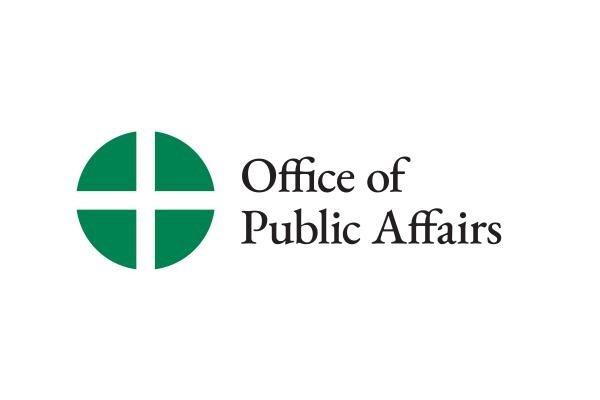United Methodists, Catholics Hold Timely Round of Dialogues
WASHINGTON (November 21, 2001) -- The second meeting of the sixth round of the United Methodist Catholic Dialogue met at St. Paul's College, Washington, DC, November 9 to 12. The theme of this round, the Church universal and local, was a timely one.
WASHINGTON (November 21, 2001) -- The second meeting of the sixth round of the United Methodist Catholic Dialogue met at St. Paul's College, Washington, DC, November 9 to 12. The theme of this round, the Church universal and local, was a timely one. The New York Times of the opening day of the meeting carried a story about the churches responses to the events of September 11 and the nation's response, citing the statements of both Methodist and Catholic bishops. The recently completed Bishops' Council (Methodist) and Synod (Catholic) were reported on by Bishop Walter Klaiber, Methodist bishop of Frankfurt, and Catholic Bishop William Skylstad of Spokane, cochairs of the dialogue. Both statements of the Council (Methodist) and Conference (Catholic) of bishops demonstrated the relationship between the universal mission of the Church and its prophetic teaching, and the local concern of the two churches and their structures of decision making. Debates in both the Council and Synod over questions of subsidiarity, collegiality and the relationship of universal and local dimensions of Church decision making, though different in the Methodist and Catholic churches, drew on the same theological roots and addressed the same questions of mission and pastoral care.
The program of this meeting consisted of three parts: the review of communion (koinonia) theological understandings of the Church in the two communities; a study of the new World Methodist Council Catholic text, Speaking the Truth in Love; and an overview of the contextual concerns over the local global dimension of church life in the variety of situations from which the scholars come to this dialogue.
Dr. Dennis Doyle of the University of Dayton and Dr. Bruce Robbins of the General Commission on Christian Unity and Interreligious Concerns of the United Methodist Church continued to clarify the dimensions of communion in the two traditions. In Catholic theology since the Council, the Church as communion has gradually displaced the centrality of institutional and juridical elements in understanding God's action in the Church. United Methodists have emphasized the relational character of the Christian mission from their origins. All of their structures, local congregations, class meetings, conferences of ministers and lay persons on a variety of levels, and bishops all serve the mission by strengthening the bonds of communion among Methodists. The fruitful discussion enabled the members of the dialogue both to appreciate one another's traditions and identify some common ground; and also plan for the next set of papers which enable us to get to know one another's understanding and practice of church life even more deeply.
The second dimension of the Dialogue reviewed the work of the international commission sponsored by the World Methodist Council and the Pontifical Council for Promoting Christian Unity. This historic text, Speaking the Truth in Love, the seventh in this series, takes on the question of teaching authority among Methodists and Catholics for the first time at this depth. The Dialogue was lead through the study by Dr. Richard Gaillardetz of the University of Toledo and by Dr. Jarrett Gray of St Paul School of Theology, Kansas City. The text itself builds on a common understanding of the Church's teaching authority as outlined in Ephesians 4:1-6. It explores the different emphases the two communities bring to the common affirmation that the Church is maintained in the truth. It is particularly helpful in outlining the urge for full, visible unity in teaching with a common prophetic voice. The final section of the text outlines the differences of Methodist and Catholic structures of authoritative teaching and differences over such issues as infallibility and lay participation.
The US dialogue was very appreciative of this text. It asked itself what particular resources in this text would be resources for its report on the global and local dimension of the Church's teaching, and in resolving differences between Methodists and Catholics. It discussed how this text can impact local Methodist and Catholic parishes that are living and working together. It also asked what particular contributions can this US dialogue make to the discussion from the particular context in this country. This discussion explored both theological issues, like the prophetic character of the Church's teaching authority, which are important in the US context; and also the style of text to be developed that can contribute to the worldwide theological discussion and the concrete, practical situation of our churches together in America.
Finally, time was given to discussing concrete, contextual challenges and opportunities in the global and local dimensions of the lives of the churches. Bishop Klaiber talked about the development of the Carta Ecumenica of Europe, approved by the Catholic, Protestant, Orthodox and Anglican churches of both Eastern and Western Europe. In the US discussions of liturgical adaptation, renewal and translation demonstrate the significance of global and local accountability. Bishop Skylstad talked about the Northwest bishops' work on the pastoral on the Columbia River as an example of a local environmental concern which has both global and local implications. The discussion of the United Methodist debates, as a Church that is primarily American, but with conferences (like Catholic dioceses) in Europe, Africa and the Philippines, show this issue's importance for Methodist internal life. The emerging role of Bishops' Conferences since the Vatican Council demonstrate the importance of these issues in internal Catholic life during this moment of history.
The next meeting will take place in San Pedro, California, May 6 - 8, 2002. Papers were assigned and the members of the dialogue will work to learn more about the understanding and structure of each others' churches in order to begin to identify areas of convergence and challenges that will be dealt with in a report to be developed for the churches.

